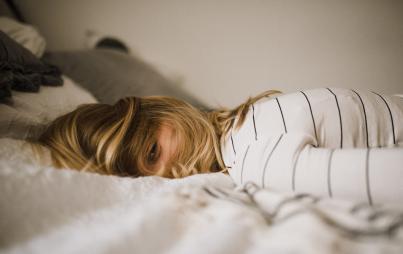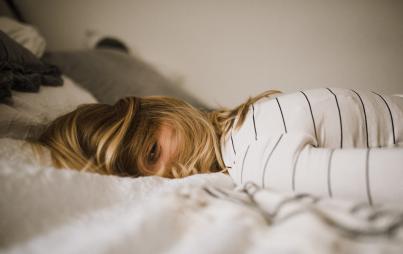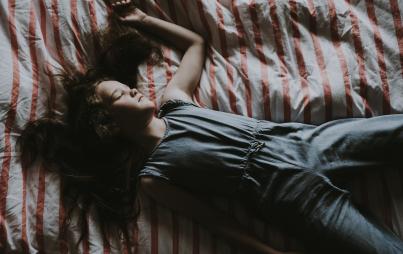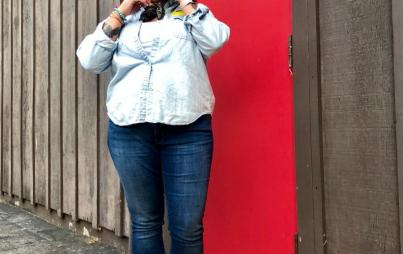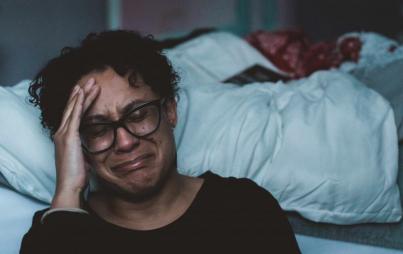
Photo by Kinga Cichewicz on Unsplash
This article first appeared on SHE'SAID' and has been republished with permission.
Our sleep needs vary with our age and lifestyle, but I doubt I’m the only one who remembers how well I used to sleep when I was a teenager and wants to experience that level of blissful rest again.
Nearly half of all adult Americans (48 percent) think they don’t get enough shut eye, and this can lead to a bunch of health problems ranging from tiredness and lack of concentration, to more serious issues like weight gain, diabetes, and heart concerns. The National Sleep Foundation recommendsadults get between seven to nine hours of sleep a night, but it’s estimated around 40 per cent of us get much less than that. So why aren’t we sleeping?
Whether we feel tired or awake is determined by our circadian rhythm – a kind of internal body clock which is largely controlled by light, hence why we’re (supposed to be) more alert in the daytime, and sleepier at night. And just like our physical body, our internal clock changes as we age. Teenagers tend to get a lot of ‘stage three slow-wave deep sleep’, which is the most restorative. However, as you go through your twenties and beyond, stage three is replaced with the less restorative ‘stage two middle sleep’, which is why we feel more tired now than we did in our teens.
But if you’re desperate for some quality sleep or suffering from insomnia, it’s not a lost cause; there are some little things you can do that’ll have you on your way to snoozing like a 16 year-old on a Saturday morning again…
1. Turn off the lights

Our body clock kicks in by releasing melatonin at night, but only if it gets the right cues from our environment, and light tends to mess up this process. Before electricity, people slept differently because they were ruled by the sun and their own body clocks. Of course, no one today is going to go to bed when the sun sets or remove all the light bulbs from their home, but there are things you can do.
New York University School of Medicine associate professor, Joyce Malsleben, explains, “melatonin is your hormone of darkness – it won’t flow with the lights on, so you want to transition to dark as early as 9 or 10 o’clock.”
By just turning off the lights or moving to a dimmer room, you’ll give your body a chance to naturally prepare for sleep.
2. Download an app

So now you’re sitting in the dark at 10pm, but you aren’t tired. What do you do? Sleep experts advise against using phones before bed because the blue light is really stimulating and is another reason we might not be getting the sleep we so desperately crave.
The author of a study on the effects of blue light on sleep, Dr Anne-Marie Chang, found people who used electronics before bed “took longer to fall asleep and had reduced evening sleepiness, reduced melatonin secretion, later timing of their circadian clock and reduced next-morning alertness”.
Thank goodness it’s 2019, and there is an app for that. Android phones have a range of apps to filter blue light, and you can get software for your computer as well. Unfortunately for Apple users, there is nothing for iOS software, so turning your brightness right down and the old ‘don’t use your phone two hours before bed’ rule will have to apply to you.
You Might Also Like: 6 Kinds Of Naps And How To Get The Most Out Of Them
3. No coffee in the afternoon

Mount Sinai Hospital Centre for Sleep Medicine director, Dr Steven Feinsilver, warns that “caffeine has an effect on both getting to sleep and staying asleep, and the effects may last up to 12 hours. One of the first things any poor sleeper should do is limit caffeine, particularly after noon or at least eight hours before bedtime.”
But never fear, your morning cup of coffee is still totally okay and shouldn’t affect your sleep at all. Thank god!
4. Have sex before bed

As if we needed another reason to do the no pants dance. Having an orgasm before bed helps to release endorphins and relieve stress, relaxing the body and mind, and making you ready for sleep.
Yale School of Medicine associate professor and OBGYN, Saralyn Mark, says “it’s all about our hormone production during intercourse”. Sex decreases the production of the stress chemical cortisol, leaving you feeling relaxed and making it easier to fall asleep.
For the ladies, a study from the Journal of Women’s Health found that estrogen levels increase during sex, and this can make it easier to enter the REM cycle of deep sleep. And men don’t miss out, either. Psychiatrist, Sheenie Ambardar, adds “after an orgasm, the hormone prolactin is released, which is responsible for the feelings of relaxation and sleepiness”. So, whether it’s with someone else or with yourself and a great vibrator (we recommend these babies), spending some time in bed and notsleeping can help you sleep a hell of a lot better.
5. Make sleep a priority

Teenagers and adults have such different sleep habits because as we enter adulthood, our lives become busier. Because we have so much to do, sleep ends up being pushed aside so we can get more done, and we start to see sleep as something that can be sacrificed.
The best thing you can do if you want to sleep like you are a teenager again is to make sleep a priority. Don’t do it after you’ve done everything else; stop doing what you’re doing when the clock strikes 10pm, and just hop into bed.
Images via favim.com, giphy.com and tumblr.com.



